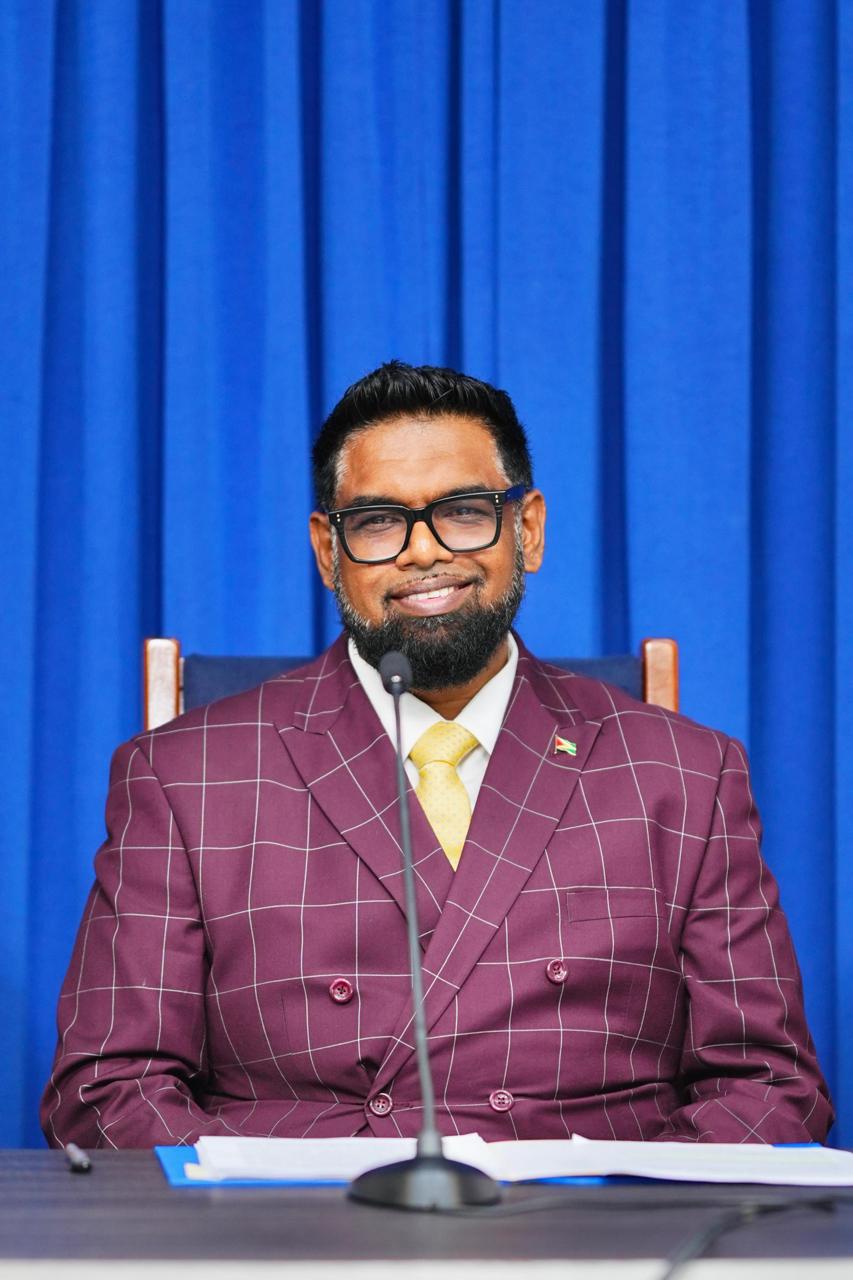From passports to patient care, Guyana’s bold digital transformation aims to make government faster and more accessible
Georgetown, Guyana (September 20, 2025) His Excellency President Dr Irfaan Ali stated that his government is pursuing an ambitious national digitisation programme driven by a strategic focus on digital infrastructure, artificial intelligence (AI), cross-agency collaboration, and the integration of ICT systems, which will see most of government services fully digitised before the end of the second quarter in 2026.
The Head of State outlined his Government’s extensive transformational plans for realising digital Guyana at his first press conference after his re-election to serve a second term as President, on Monday, at the Office of the President.
“As you know, a few days ago I held a meeting with all the IT heads and outlined the digital transformation plan aimed at fully digitalising all government services before the end of the second quarter in 2026. I have announced the appointment of the Chief Technology Officer, who will be supported by the NDMA [National Data Management Authority], to manage the digitisation process and to implement a digital platform to monitor and track key performance indicators for government agencies, ensuring greater transparency, accountability, and efficiency.”
The President underscored that the aim is to have an integrated system that works on a common framework across agencies that improves efficiency, transparency and the ease of doing business.
“This will apply across all agencies, including the security agencies: the way in which you get a security clearance, the way in which you get your birth certificate, the way in which persons apply for a death certificate. All of these systems are actively being migrated onto a digital platform.”
Giving an update on the progress of some of the initiatives, the President noted that the online passport portal is in the final stage of development and is expected to go live before the end of the year. This system, he said, will eliminate the long lines and congestion at the passport office.
“We will have a decentralised system where appointments are booked online, and you will go to the nearest service centre to you.”
The President explained that the border control and e-gate system went live in January, while the e-passport issuance system went live in February of this year, and has resulted in improved security at airports and border crossings. Ithas also increased accuracy and reliability in the verification of traveller data.
These improvements, the President noted, align with International Civil Aviation Organisation standards.
“The e-passport provides the Guyanese citizen with a next-generation travel document full of advanced security features and functionalities to facilitate safer and more efficient international travel.”
His Excellency spoke extensively on modernising and digitising the healthcare system in Guyana, a vision that he has articulated previously. He explained that one aspect of this includes the electronic patient health system. The initial phase involves digitising the records of all patients at the Georgetown Public Hospital Corporation (GPHC), which started in March 2025 and is expected to conclude by mid-2026, with patients’ records at GPHC expected to go live by the end of the first quarter in 2026.
“In addition, the Ministry of Health has launched a pilot online appointment system at the Festival City Polyclinic. This is a system under testing. As you know, we don’t want the lines that you see in the hospitals and clinics. We want to move the system into an app-based system where you have appointments, so you don’t have to waste your time or sit at these clinics for hours.”
The President added that this pilot project is expected to be fully implemented at GPHC within the first quarter of 2026, and then in all other regional hospitals and clinics across the country.
“Outside of this, the One Health Project, which is a US $15m project, is being implemented. The aim of this is to enhance our disease surveillance, enhance our laboratory system to a level three system, and to enhance our human resource capacity through recruitment and training in pandemic preparedness.”
A Unified Platform
Modernising and digitising government sectors and services across Guyana is aimed at creating a transformational digital platform that will transform the everyday lives of every Guyanese and revolutionise government services, the President had said.
This new technologically advanced era, he explained, is grounded in innovation, inclusion and improving efficiency. Digital Guyana, he said, represents his government’s commitment to building a modern state where technology is used to enhance efficiency.
“Digital Guyana is our commitment to building a modern state where technology makes public service faster, faster services, more accessible and more responsive.”
The objective is to enhance the quality of life for all Guyanese citizens, optimise public systems, and reducebureaucratic processes, thereby establishing a stable, resilient, and service-oriented infrastructure. The platform will employ a unified access point through a website and mobile applications, enabling citizens to apply for passports, birth certificates, driver’s licences, and national identification cards, including the forthcoming e-identification cards.
Additionally, it will provide access to education records, enable tax filing, facilitate business registration, housing applications, and bill payments.
During a previous live broadcast where the President updated the public on his government’s expansive plans for creating digital Guyana, he said that the Government will also implement an ‘Ask Gov’ platform to facilitate 24/7 assistance to the public.
“Powered by generative AI, AskGov can answer all government queries and solve problems without human intervention.”
In education, students and teachers will benefit from AI through personalised learning and interactive curricula, even in the most remote regions of the country. The health sector will also see advances, with AI supporting disease diagnosis and tracking.
The platform will also feature an integrated Geographic Information System (GIS), designed to map and monitor national infrastructure in real time. This will include 3D models of physical assets such as roads, bridges, kokers, drainage systems, underground conduits, utility poles and hydrants. The GIS will provide a unified data layer for public and private sector use, enhancing planning, emergency response, and utility coordination. The approach will help eliminate traditional inefficiencies.
“We want digital Guyana to make life enjoyable. We want digital Guyana to make life easier, to make systems more efficient, to make systems more reliable, to make doing business easier.”
AI-driven surveillance is anticipated to enhance the detection of criminal activities and emergency response capabilities. Concurrently, intelligent traffic management systems are expected to alleviate congestion and improve road safety. Environmental sensors will be employed to monitor noise pollution, air quality, and illegal dumping activities. Furthermore, the improved sharing of data among law enforcement agencies will facilitate swifter and more coordinated responses, thereby fostering cleaner and safer communities.
These initiatives will complement other transformational projects, including the One Guyana Digital School, numerous telemedicine sites established across the country, including in hinterland and riverine communities, and the Guyana Online Academy of Learning (GOAL) scholarship programme, which has awarded more than 30,000 scholarships to students throughout Guyana.

